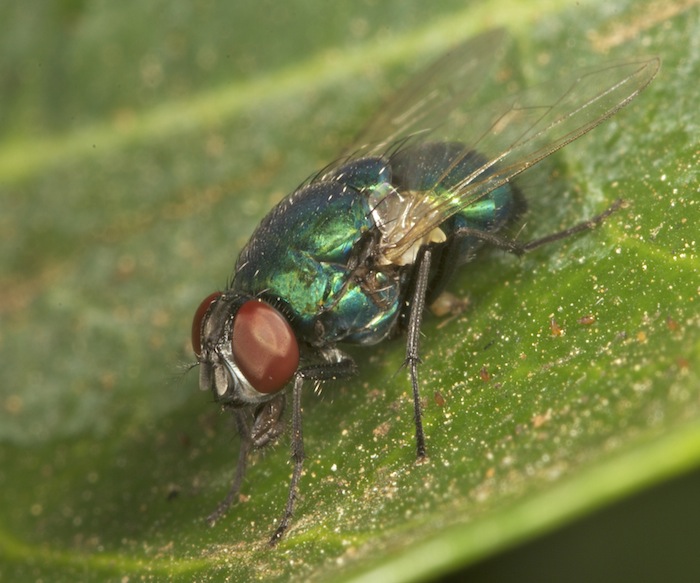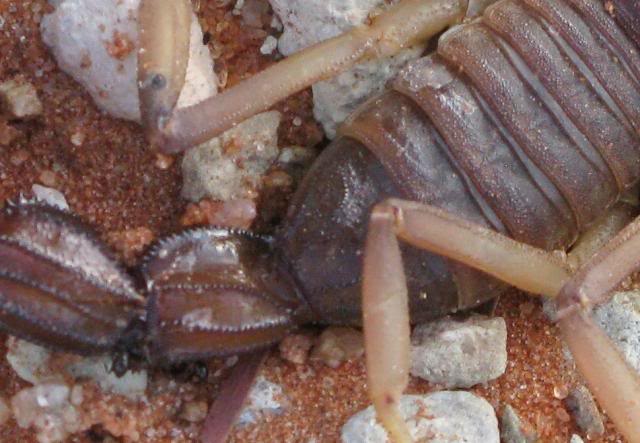Page 61 of 295
Re: Insect or Invertebrates Identification
Posted: Sat Mar 01, 2014 7:34 am
by Toko
ExFmem wrote:This one doesn't appear to have the bands on the abdomen, just plain green. Same as above, or different? Chrysomya or Lucilia sp.??

Sept. Kruger
According to this there are 7 species of Chrysomya
http://eprints.ru.ac.za/1951/1/Richards_et_al_2009c.pdf
How about female C. megacephala?
http://cookislands.bishopmuseum.org/MM/ ... M1_MXa.jpg
http://cookislands.bishopmuseum.org/species.asp?id=9197
Glossy, robust fly, 7-10mmBL. HEAD large red eyes; Male eyes meet topside, and have top 60% with distinctly larger facets; Female eyes widely separated topside and entirely with small facets. THORAX and ABDOMEN glossy dark blue to dark green. WINGS transparent.
Have googled the other ones mentioned in Villet's paper, they are all banded

But my feeling is more that is a Lucilia, perhaps Lucilia cuprina
http://www.efoto.lt/files/images/25378/ ... 6701-1.jpg
Adults are easy to distinguish due to bristles on the meron, in addition to the arista, the prominent hair on the terminal antennal segment being plumose, or feathery. L. cuprina are most easily identified by their strong dorsal setae and their black thoracic spiracle.
Here Lucilia sericata
http://entnemdept.ufl.edu/creatures/liv ... ricata.htm
Perhaps M Villet would be so kind and identify for us

Looking at all the photos on the www, I am not sure if the IDs here are correct
 https://africawild-forum.com/viewtopic.p ... 14#p147314
https://africawild-forum.com/viewtopic.p ... 14#p147314
Re: Insect or Invertebrates Identification
Posted: Sat Mar 01, 2014 7:46 am
by Toko
Sarcophaga haemorrhoidalis was first described by Carl Fredrik Fallén (1764–1830), a Swedish botanist and entomologist, in 1817 during his tenure at Lund University between 1814–1827. Fallén first named this species Musca haemorrhoidalis in 1817 not knowing that Charles Joseph de Villers[5] had already named an unrelated species Musca haemorrhoidalis in 1789. In 1826, Johann Wilhelm Meigen, a German entomologist famous for his pioneering work on Diptera, described the same species that Fallén had described in 1817 as Sarcophaga cruentata following Meigen's description of the genus Sarcophaga. Since two different species can not share the same name,
http://en.wikipedia.org/wiki/Sarcophaga_haemorrhoidalis
here a good description of S. haemorrhoidalis
http://entnemdept.ufl.edu/creatures/mis ... sh_fly.htm
But there are more than 40 species
 http://www.ru.ac.za/static/departments/ ... gidae.html
http://www.ru.ac.za/static/departments/ ... gidae.html
Expert required

Re: Insect or Invertebrates Identification
Posted: Sat Mar 01, 2014 9:24 am
by Toko
nan wrote:Scorpion
Kruger, Satara - 19.3.2011




Tree Creeping Scorpion
Opisthacanthus asper
Family: Liochelidae
Description
This species has a totally dark morph and a morph with lighter legs.
Distribution
Botswana, South Africa, Mozambique, Zimbabwe.
Habitat
Inhabits cracks in trees, under loose bark. Often found in Mopane and Knobthorn trees.
Vers shy, rarely stings in defense.
Re: Insect or Invertebrates Identification
Posted: Sat Mar 01, 2014 10:40 am
by nan

I will post in the good thread

Re: Insect or Invertebrates Identification
Posted: Sat Mar 01, 2014 11:34 am
by Toko
ExFmem wrote:??? Drone fly


Eristalinus or Eristalis ?

I have NO idea.

Kruger
This requires research



Have not seen a
Eristalinus with eye stripes not vertical

Re: Insect or Invertebrates Identification
Posted: Sat Mar 01, 2014 12:40 pm
by Toko
nan wrote:Scorpion
Kgalagadi - Twee Rivieren - 16.1.2012

but which one

A Parabuthus
If you can make a close-up we can see if it is hairy and then get the Id on species level - but be careful with getting close, this is a highly dangerous species

Re: Insect or Invertebrates Identification
Posted: Sat Mar 01, 2014 12:52 pm
by nan
hairy... will try

Re: Insect or Invertebrates Identification
Posted: Sat Mar 01, 2014 4:12 pm
by nan
it seems not


Re: Insect or Invertebrates Identification
Posted: Sat Mar 01, 2014 4:22 pm
by Toko


 Granulated Thick-tailed Scorpion Parabuthus granulatus
Granulated Thick-tailed Scorpion Parabuthus granulatus
Re: Insect or Invertebrates Identification
Posted: Sat Mar 01, 2014 4:40 pm
by nan




